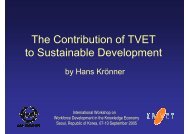Learning for Life, Work and the Future Initial ... - Unesco-Unevoc
Learning for Life, Work and the Future Initial ... - Unesco-Unevoc
Learning for Life, Work and the Future Initial ... - Unesco-Unevoc
Create successful ePaper yourself
Turn your PDF publications into a flip-book with our unique Google optimized e-Paper software.
Page 30 Call <strong>for</strong> Papers <strong>Learning</strong> <strong>for</strong> <strong>Life</strong>, <strong>Work</strong> <strong>and</strong> <strong>the</strong> <strong>Future</strong><br />
• Only a maximum of two papers per author will be<br />
accepted<br />
• Papers should be submitted in English only as this<br />
will be <strong>the</strong> working language of <strong>the</strong> workshop<br />
• Discussion Paper(s) should be accompanied by <strong>the</strong><br />
technical in<strong>for</strong>mation requested in <strong>the</strong> Annex.<br />
There, authors can also state if <strong>the</strong>y have reservations<br />
against having <strong>the</strong>ir papers published, or if<br />
<strong>the</strong>y are not interested in attending <strong>the</strong> workshop<br />
but would have no objection to having <strong>the</strong>ir papers<br />
published<br />
• All authors of papers will be in<strong>for</strong>med about<br />
whe<strong>the</strong>r <strong>the</strong>y will be invited to <strong>the</strong> workshop.<br />
Content<br />
Each paper should focus on one of <strong>the</strong> following Key<br />
Topics:<br />
Key Topic Examples of Key Aspects Possible Sub-Themes <strong>for</strong> Paper<br />
Access to TVET<br />
Unemployment<br />
Training in <strong>and</strong> <strong>for</strong><br />
<strong>the</strong> in<strong>for</strong>mal sector<br />
Quality of TVET<br />
In<strong>for</strong>mation <strong>and</strong><br />
Communications<br />
Technology (ICT)<br />
Staff<br />
• Equipment/infrastructure<br />
• Facilities <strong>for</strong> deliver<br />
• Access <strong>and</strong> equal opportunities<br />
• Not enough supply of TVET<br />
programmes<br />
• Appropriateness of TVET programmes<br />
(target groups, local needs).<br />
• Youth unemployment<br />
• Limited job opportunities in <strong>for</strong>mal<br />
sector<br />
• Training <strong>for</strong> sustainable (self-)<br />
employment<br />
• Retrenchment.<br />
• Attitude to self-employment<br />
• Frequent bankruptcy<br />
• Recognition of training in <strong>the</strong><br />
in<strong>for</strong>mal sector<br />
• Quality difficult to measure<br />
• Formal training opportunities <strong>for</strong><br />
those in self-employment.<br />
• Curricula <strong>for</strong> lifelong learning<br />
• Human resources that can compete in<br />
a globalised world<br />
• Transferable skills<br />
• Appropriateness of TVET curricula<br />
<strong>and</strong> programmes to local economy.<br />
• Provision of ICT skills<br />
• IT based learning<br />
• ICT infrastructure<br />
• Access to Internet <strong>and</strong> Intranets.<br />
• Quantity <strong>and</strong> quality of teachers<br />
• Staff trained to offer IT skills.<br />
• Innovative use of facilities <strong>and</strong> equipment<br />
• Cost-effective solutions <strong>for</strong> design, construction <strong>and</strong> use of<br />
facilities<br />
• Equal opportunities policies <strong>and</strong> practice<br />
• Range <strong>and</strong> flexibility of programmes to suit all target<br />
groups<br />
• How <strong>the</strong> relevance of programmes to <strong>the</strong> local economy is<br />
ensured.<br />
• TVET programmes to help school leavers<br />
• How skills <strong>for</strong> self-employment can be developed<br />
• Entrepreneurship courses, content, value, etc<br />
• Multi-skilling <strong>and</strong> transferable skills<br />
• Re-training programmes <strong>for</strong> unemployed adults.<br />
• Support <strong>for</strong> in<strong>for</strong>mal sector training (financial,<br />
professional, logistic, government schemes, etc)<br />
• Logistics of training <strong>for</strong> those self-employed (time,<br />
place…)<br />
• Identification of training needs <strong>and</strong> course development<br />
• Impact/ evaluation of training <strong>for</strong> in<strong>for</strong>mal sector groups<br />
• Recognition <strong>and</strong> accreditation of prior learning.<br />
• Curriculum projects <strong>for</strong> lifelong learning<br />
• Flexible modes of learning (modules, distance, ICT <strong>and</strong><br />
multimedia, etc)<br />
• Training <strong>and</strong> updating of skills <strong>for</strong> teachers/ lecturers/<br />
instructors<br />
• Experiences with multi-skilling <strong>and</strong> transferable skills<br />
• Introduction of key-skills/ core/skills<br />
• Involvement of stakeholders in curriculum development<br />
<strong>and</strong> delivery; partnerships<br />
• Ways of ensuring curricula <strong>and</strong> delivery meet global<br />
st<strong>and</strong>ards.<br />
• Effective training approaches<br />
• Projects <strong>for</strong> ICT-based learning<br />
• Role <strong>and</strong> use of ICT in TVET<br />
• Distance education <strong>and</strong> ICT<br />
• Innovative solutions to <strong>the</strong> hardware cost problem.<br />
• Innovations in technical teacher training<br />
• Ensuring an on-going learning programme<br />
• Use of ICT <strong>and</strong> multimedia in technical teacher training<br />
• Preparing teaching staff <strong>for</strong> various ICT initiatives in<br />
TVET<br />
• Teaching as a second career.





